Session Nine - Acts
Author
Luke. The author of the Acts of the Apostles (as it has been known since the 2nd Century) is the author of the Gospel of Luke, a disciple who traveled with Paul on his missionary journeys. The Gospel is an account of the life of Jesus Christ; Acts is the sequel, his description of part of the fulfillment of the command Jesus gave to preach the gospel "in his name among all nations, beginning at Jerusalem" (Luke 24:47). Both books were addressed to Luke's friend Theophilus (see Luke 1:1-3; Acts 1:1-3). Luke describes what Jesus "began to do" (1:1); Acts shows us what He "continued to do" through the church.
Not much is known about Theophilus. Some possibilities are that: he was Luke's friend or patron, or that the name Theophilus (which means "lover of God") is being used universally as a reference to all Christians. Luke's usage of the term "most excellent" helps to identify this character. The word (in Greek) is a "strongly affirmative honorary form of address" and every occurrence of it in the New Testament refers to governing officials.
Date of Composition
The ending of Acts (with Paul under house arrest waiting to present his case before Caesar) plays an important role in route of determining the book's date.
The earliest date for Acts is the two-year imprisonment of Paul (28:30-31), which would have been around 61-64. The Neronian persecution of 64-65 probably had not taken place by the time the book was written. There is no evidence of official repression. The Jewish revolt of 66 and/or the fall of Jerusalem in 70 are not mentioned. Many subjects in Acts would have been prominent before 70, including Gentile admission to the church, coexistence of Jews and Gentiles in the church, food requirements of the apostolic decree. There are early expressions of theology: "the Christ," "the Servant of God," "the Son of Man", Christians as "disciples,", and the use of Sunday as the first day of the week.
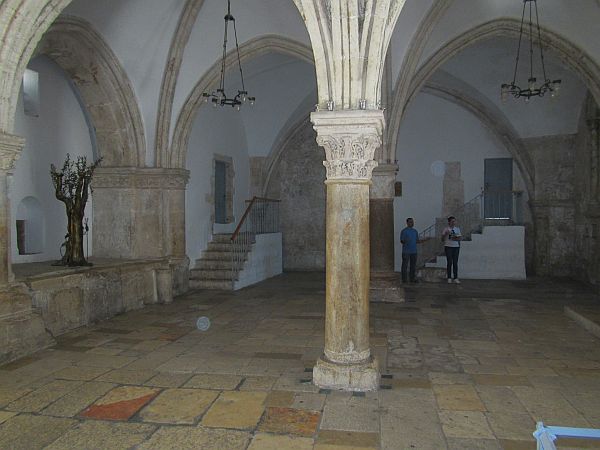
Pilgrims praying in reconstructed "Upper Room"
Location, Purpose and Audience
Acts is the only biblical book that chronicles the history of the church immediately after Jesus's ascension (the rest are letters and visions from that time). It provides a valuable account of how the church was able to grow and spread out from Jerusalem to the rest of the Roman Empire. In only three decades, a small group of frightened believers in Jerusalem transformed into an empire-wide movement of people who had committed their lives to Jesus Christ in the face of opposition, ending on a high note with Paul on the verge of taking the gospel to the Emperor in Rome.
Acts is not a complete record of everything that happened in the Church after the Christ's Ascension. Luke wrote mainly about the ministry of the Apostle Paul and included a few records about Peter and some other Apostles.
Acts is also significant for chronicling the spread of the gospel cross-culturally. It records the transition from an exclusively Jewish audience - with Peter preaching to a small group from the Upper Room - to the gospel going out among the Gentiles, primarily under the ministry of the apostle (apostolos, lit. "sent") Paul. There are no extensive accounts of individuals apart from Peter and Paul. The transition is best illustrated by Peter's vision in which he heard a voice telling him, "What God has cleaned, no longer consider unholy" (10:15). This led Peter to share the gospel with Gentiles. God wants His message of hope and salvation to extend to all people - "in Jerusalem, and in all Judea and Samaria, and even to the remotest part of the earth" (1:8).

1st Century Aramaic script of the NT, Bethlehem
There are several possible reasons why the book was written:
- to evangelize
- to defend Paul and Christianity in the face of Jewish and Gentile attacks, eg consider Paul's accounts of God's intervention and revelation in his conversion:
- "And so, King Agrippa, I obeyed that vision from heaven. I preached first to those in Damascus, then in Jerusalem and throughout all Judea, and also to the Gentiles, that all must repent of their sins and turn to God - and prove they have changed by the good things they do. Some Jews arrested me in the Temple for preaching this, and they tried to kill me. But God has protected me right up to this present time so I can testify to everyone, from the least to the greatest. I teach nothing except what the prophets and Moses said would happen - that the Messiah would suffer and be the first to rise from the dead, and in this way announce God's light to Jews and Gentiles alike."
- to present Christianity as the legitimate faith in a polytheistic society
- to defend against Gnosticism
- to catalogue part of the historical movement of the gospel from the ascension of Jesus to Paul's imprisonment, from Jerusalem to Rome
- Jewish leaders in Rome told Paul: "... we want to hear what you believe, for the only thing we know about this movement is that it is denounced everywhere." (28:22)
- to present Jesus as Lord as a defense and present fulfillment of promise against charges of false religion by both Jews and Gentiles
- to reassure second-generation Christians of the truth of Christianity and fulfillment it represents despite rejection
- to argue that the Christian Gospel is rooted in the Hebrew Scriptures' promise of salvation to both the Jews and the Gentiles
- to show that Christian was not a political movement, or a source of danger to the empire, but a spiritual movement centering on preaching the life and person of Christ.

Jaffa, or Joppa (village of Simon the Tanner)
Literary Style and Structure
A third of Acts consists of speeches and sermons. The first half centres on Peter and the church in Jerusalem; the second half centres on Paul and outreach to the world.
The book can be broken up into five sections:
- 1-6:7 - the ascension of Jesus to heaven; events surrounding early evangelistic work in Jerusalem; replacement of Judas as an apostle; the Day of Pentecost; 3000 new believers; church growth
- 6:8-9:31 - shift in the focus of evangelism to include Samaritans and proselytes; Philip proclaims Christ in Samaria and to the Ethiopian eunuch; Stephen is falsely accused and is stoned to death; his executioners lay their robes at the feet of a young Saul, who soon encounters Jesus on the road to Damascus and becomes one of Christianity's most famous converts
- 9:32-12:24 - evangelism among the Gentiles; Peter receives a revelation and visits Cornelius, a Roman Centurion, a devout man (a "God-fearer"), who becomes a follower of Christ; Saul preaches the gospel; believers (referred to initially as followers of "the way", 9:2, or "the sect of the Nazarenes", 24:5) are called "Christians" in Antioch
- 12:25-16:5 - the gospel is preached to the Gentiles further from Jerusalem; Saul changes his Hebrew name to Paul, a Greek name, to reach Gentiles Paul and Barnabas undertake missionary journeys to the Gentile world, with success and opposition; the Jerusalem Council debates the legitimacy of reaching Gentiles; Paul and others are authorised by the leaders in Jerusalem to spread the gospel to the non-Jewish nations, with fewer dogmatic rules and regulations, and a focus on Christ instead of Law (so-called Judaisers continued to attempt to bring Christians, including those with Gentile backgrounds, back under the Mosaic Law, with all its requirements - we will see more of this when we get to Galatians)
- 16:6-19:20 - Paul receives a vision and heads to Europe (Macedonia) to preach the gospel; Lydia, a Jewish woman who sold purple fabric, becomes the first convert (with her household); Paul preaches to Greek philosophers on Mars Hill (the Areopagus) and sets out on another missionary journey
- 19:21-28 - Paul travels to Jerusalem, is arrested and begins a protracted journey to Rome, to face trial; when he arrives, after imprisonment along the way, and a shipwreck off Malta, he is placed under house arrest and the book of Acts abruptly ends. Traditions suggests that Paul was executed under Nero.
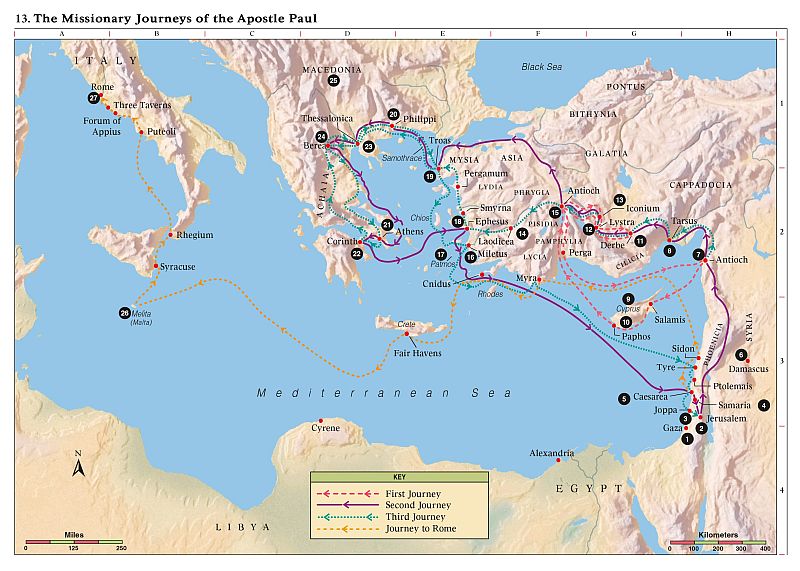
Paul's missionary journeys
Themes and Theology
- Christ is the source of our salvation:
- "Everyone who calls on the name of the Lord will be saved." (2:21)
- "There is salvation in no one else! God has given no other name under heaven by which we must be saved." (4:12)
- "Believe in the Lord Jesus and you will be saved, along with everyone in your household." (16:31)
- World evangelism - To Jerusalem - 3:1-8:3; Judea and Samaria - 8:4-12:25; and the uttermost parts of the earth - 13-28. How did obscure (timid; unlearned, 4:13) followers of an obscure religious teacher in faraway Palestine come to dominate thinking in their day and establish a world-wide inter-cultural faith, far removed from its traditions? Acts gives us part of the story.
- Luke's purposes in the Acts of the Apostles are to identify the church, to establish the legitimacy of the gospel and to demonstrate that God is an active force in history. He wants to show that the communities of Jewish and Gentile Christians are the true heirs of God's promises to Israel. He gives the history of the early church from the last decades of the first century as the communities become separated from their strictly Jewish origins, and Paul plays a lead role. Acts offers an apologetic for the mixed mission of the church: to Jews and Gentiles. Luke was an eyewitness to some of what he reports about the roles of God, Christ the Holy Spirit, and the church.
- Luke emphasizes the Acts of the Holy Spirit. The book begins with Jesus' promise of the Holy Spirit, which is later fulfilled in reference to the Jews (Ch. 2), and then for the Gentiles (Ch. 10). References to the Holy Spirit come in a variety of ways. Many of the occurrences are references about people being filled with the Holy Spirit: 2:4; 4:8, 31; 9:17; 13:9, 52. See below.
"Each of you must repent of your sins and turn to God, and be baptized in the name of Jesus Christ for the forgiveness of your sins. Then you will receive the gift of the Holy Spirit. This promise is to you, to your children, and to those far away - all who have been called by the Lord our God." (2:38, 39)
- Acts promises that Jesus will return - 1:11
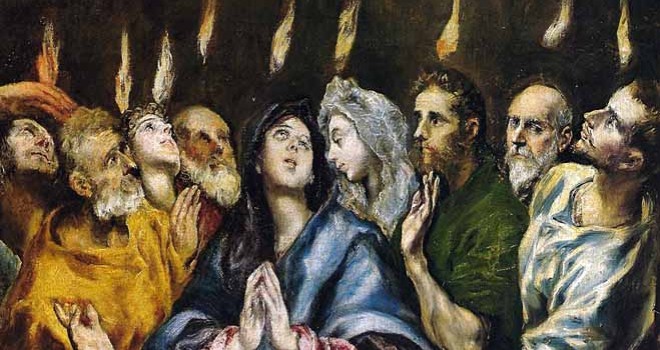
El Greco's depiction of the Day of Pentecost
The Holy Spirit in Acts
The Acts of the Apostles could be called The Acts of the Holy Spirit. there are some seventy references to the Holy Spirit. Key ones are as follows:
- Jesus' post-resurrection ministry & teaching were in the power of the Holy Spirit - 1:2; even though some of the disciples had three years training this would not be enough without the Holy Spirit's empowerment
- Jesus' command to the disciples to wait for the Holy Spirit (even though they probably wanted to get out of Jerusalem) to give them power (dunamis) to reach the world with the Gospel - 1:8
- the coming of the Holy Spirit on the Day of Pentecost (a feast 50 days after Passover) - 2:1-4; some have called Pentecost the "birthday of the church"
- the apostles are filled with the Spirit and speak the Word with boldness - 4:32
- the Spirit is given to believers in Samaria - 8:15-17
- the coming of the Holy Spirit on Cornelius' household was a sign that God had accepted them - 10:44-48
- the Holy Spirit fell on 12 disciples of John the Baptist in Ephesus - 19:1-7
The Holy Spirit is the power source in the church, for miracles, boldness, insight and witness.
Speaking in Tongues in Acts
Speaking in tongues (glossolalia) proceeded from the infilling of the Holy Spirit. Tongues were the outward and audible expression. Moreover, these tongues, whether spoken in Jerusalem or Caesarea, were in praise of God and primarily directed to God. In Acts 2 they were understood as real languages.
- on the day of Pentecost, in Jerusalem
- household of Cornelius - 10:44-46; Peter links the fact that they spoke in tongues to receiving the Holy Spirit, in 11:15, 16)
- believers in Ephesus - 19:6
- may be implied in the response in Chapter 8 - Samaria
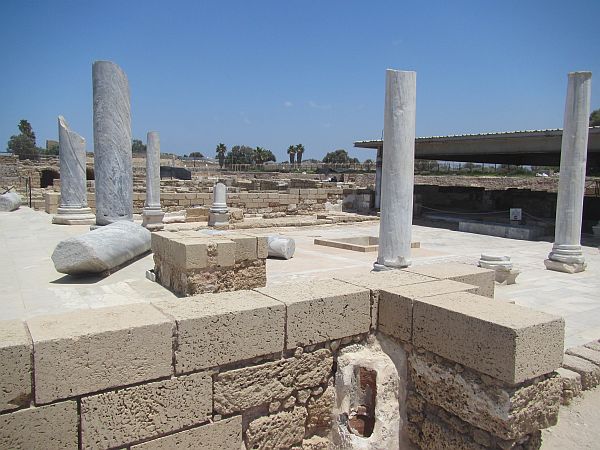
Caesarea Maritima, where Paul was held awaiting trial
Witnesses
"You will be my witnesses" (1:8). The word used is martys. Sound like martyr? Consider the kangaroo court that sentenced and executed Stephen, the first Christian martyr - 6:8-7.
Persecution and repression (initiated with the lynching of Stephen, on the grounds of blasphemy) caused the church to disperse, starting with movement outwards to Samaria in Chapter 8.
"... the believers who had been scattered during the persecution after Stephen's death travelled as far as Phoenicia, Cyprus, and Antioch of Syria. They preached the word of God, but only to Jews. However, some of the believers who went to Antioch from Cyprus and Cyrene began preaching to the Gentiles about the Lord Jesus. The power of the Lord was with them, and a large number of these Gentiles believed and turned to the Lord." (11:19-22)
Thereafter the church gradually became a tale of two cities: Jerusalem and Antioch (the third largest city in the Roman Empire at the time and a major cultural and commercial entrepôt).
- After Antioch, Christianity is seen as a separate movement.
Antioch became the launching pad for missions/world evangelism (13), plus hardship, persecution, arrests, false accusations, even a strike (19:23-28). The result was planting of churches across the empire. Read the accounts of Paul's missionary journeys, and those who accompanied him.
- Details of evangelism and church planting in various locations, which occurred during the Pauline period, will be covered in the Epistles (letters, many of which were written during the period covered by Acts, including 13 epistles by Paul).

Paul's Bay, Malta
Biblical Examples of Leadership
"In those days when the number of disciples was increasing, the Hellenistic Jews among them complained against the Hebraic Jews because their widows were being overlooked in the daily distribution of food. So the Twelve gathered all the disciples together and said, 'It would not be right for us to neglect the ministry of the word of God in order to wait on tables. Brothers and sisters, choose seven men from among you who are known to be full of the Spirit and wisdom. We will turn this responsibility over to them and will give our attention to prayer and the ministry of the word.' This proposal pleased the whole group. They chose Stephen, a man full of faith and of the Holy Spirit; also Philip, Procorus, Nicanor, Timon, Parmenas, and Nicolas from Antioch, a convert to Judaism. They presented these men to the apostles, who prayed and laid their hands on them."
(Acts 6:1-6)
There are many doors into Christian leadership. The ones we think are most obvious are not always the ones God chooses. If we are humble, He will lead us in the context of His purposes.
The dominant model of leadership in our world is the hierarchy model - the leader at the top directs a team of underlings. This case study from Acts, involving the selection of some of the Christian community's first leaders, is instructive, because it "worked"; we are still talking about it 2000 years later.
The selection criteria required that candidates be:
- readily available to be used by God to serve others; the initial impression is that those who served tables performed more of an "administrative function"; to assist a marginalized group this way would involve being taken out of the limelight of mainstream ministry and doing some fairly mundane, perhaps messy, jobs - God makes no distinction; it is matter of call, not value
- full of faith in God (not faith in their abilities, their connections, or even their concepts of "serving God"); such leadership is not knowing "stuff" but knowing Him.
- full of the Holy Spirit (this had to be evident to others)
- full of wisdom (God's wisdom, not man's ideas, cf James 3:13-17)
- already actively involved in Christian work (not merely aspirational or conditional)
- willing to serve impartially
- not obsessive about their "ministries", gifts, prestige, pecking order or experience
- inclusive, willing to work together as a team
- influential, for the right motives
- recognized by the Christian community as men of integrity
- willing to submit to other leaders, and to one another
Another good example of leadership in Acts is Paul's parting message to the Ephesian elders:
"I have done the Lord's work humbly and with many tears. I have endured the trials that came to me from the plots of the Jews. I never shrank back from telling you what you needed to hear, either publicly or in your homes. I have had one message for Jews and Greeks alike - the necessity of repenting from sin and turning to God, and of having faith in our Lord Jesus." (20:19-21)
"So guard yourselves and God's people. Feed and shepherd God's flock—his church, purchased with his own blood - over which the Holy Spirit has appointed you as leaders. I know that false teachers, like vicious wolves, will come in among you after I leave, not sparing the flock. Even some men from your own group will rise up and distort the truth in order to draw a following. Watch out! Remember the three years I was with you - my constant watch and care over you night and day, and my many tears for you. And now I entrust you to God and the message of his grace that is able to build you up and give you an inheritance with all those he has set apart for himself. I have never coveted anyone's silver or gold or fine clothes. You know that these hands of mine have worked to supply my own needs and even the needs of those who were with me. And I have been a constant example of how you can help those in need by working hard. You should remember the words of the Lord Jesus: 'It is more blessed to give than to receive.'" (20:28-35)
For Reflection:
- the early believers discovered supernatural boldness to live for Christ and preach the Gospel when the Holy Spirit came on them - what about us?
- witness and evangelism (with opposition) were primary drivers in the early church
- the context of true discipleship is in community with other Christians
- "All the believers were united in heart and mind. And they felt that what they owned was not their own, so they shared everything they had." - is this a mandatory model (for Gentile churches)?
- when Saul thought he was stamping out Christianity he was actually spreading it
- when Paul, as a new Christian, was excluded or neglected by the leadership, Barnabas went out and brought him in (11:25)
- the story in The Book of Acts continues with us
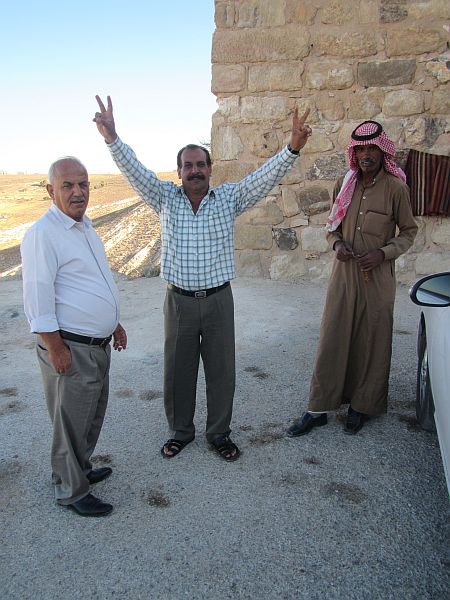
Into all the world
Further readings:
Bruce, FF, Various editions, The Book of Acts
Wagner, P, Various editions, Spreading the Fire, Lighting the World, Blazing the Way (3 volumes)







